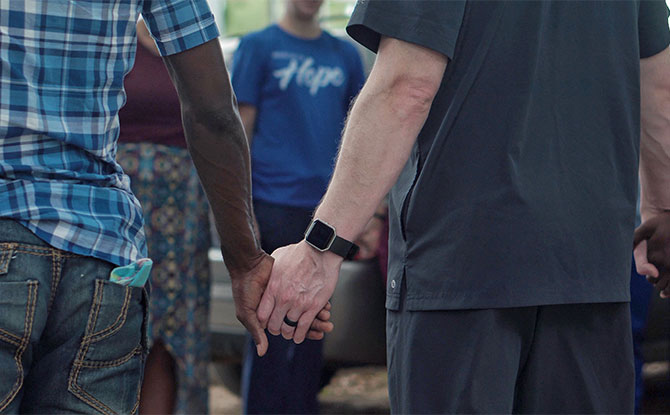
When loved ones experience a severe and sudden loss, many of us want to be there for them, but words might often fail and sometimes we might not do anything at all for the fear of doing the wrong thing.
On the flip side, we might also have had experiences in our lives where we have had loved ones show up with good intentions during losses in our lives but end up saying things that hurt more than they help.
Although there is no perfect way to support or respond to someone who is going through extreme pain or loss, here are some good ground rules that you can follow when supporting a grieving friend.
Know that there is no right way to grieve

Grief is a very personal experience, and it belongs entirely to the person experiencing it. Even if the situation seems small to you, a loss of any kind is still valid. Do not make the grieving process about you. Being mindful of how your friend is reacting and practising good listening skills is the best way to understand how to follow their lead when offering support. Reassure them that there isn’t a timeline on how soon they need to “feel better”.
Be very mindful of the language that is used when speaking to them
Words are powerful, and especially so when someone is emotionally vulnerable. Avoid phrases such as:
- “I know exactly what you feel.”
- “I’ve been through this situation before.”
- “You must be feeling _____.”
- “You should try _____.”
Instead, use phrases such as:
- “I’m here for you.”
- “I hear you.”
- “I’m sorry that you are going through this.”
- “Your pain is valid.”
These phrases are much more supportive and helpful. Avoid using religious phrases or opinions unless asked or unless first initiated by the griever.
Be okay to not use words and let your presence speak. Resist the urge to fill the silence and make an effort to allow it space. Sometimes just having the space to cry, vent, think and feel is the best thing you can offer.
It is also okay to admit that you do not know what to do, as showing up for someone in need does not equate to needing all the answers. Be genuine in your communication with phrases such as “I’m not sure what to say, but I want you to know I care.” Unless you are asked for your advice, don’t be quick to offer it.
Speak the truth and state the present

It can be tempting to make statements to reassure your friend such as “things will be okay in the future”, “they are in a better place”, “they wouldn’t want to see you like this” or “look at what you have to be thankful for”, however, we might say these things because we feel uncomfortable witnessing someone in pain or because we wish to take away the discomfort of our friend.
The important part of supporting friends through pain is to acknowledge that there is pain and listening to what they have to say. Focus on what is true at the moment with phrases such as “This is painful.”, “This is a safe space to say and feel whatever you need to.”, “You are loved.”
Respect boundaries and help communicate them
To the new griever, an influx of people who want to show their support can be overwhelming. Depending on how close you are to the friend, consider being or appointing a gatekeeper to relay information to those who might not be in the trusted circle but still wish to express their condolences and support.
It is also important that you ask permission before making any decisions or changes on behalf of a person, such as moving furniture or giving away items that are no longer in use as it might hold significance to the loss that has just happened.
As grief is a personal process, do respect the need for space if that is requested of you. It need not be taken personally if your friend is not ready for you to show up to be there for them immediately.
Show up in the long run

As someone who is there to support a friend who is grieving, be mindful that this supporting a friend through the grieving process is not a one-time situation. Stay in touch with the grieving person, periodically checking in, dropping by, or sending letters or cards. Once the initial shock of the loss has worn off, your support is more valuable than ever.
Make concrete offers for reoccurring things
It is difficult for many grieving people to ask for help. They might feel guilty about receiving so much attention, fear being a burden to others, or not have the capacity or interest to reach out. Thus, instead of saying “Let me know if there’s anything I can do,” make it easier for them by making specific suggestions such as:
- “I’m going to the market this afternoon. What can I bring you from there?”
- “I’ve made some food. Would it be okay for me to come over at 6 pm?”
- “I know that pick your kids up from tuition every Wednesday. I can help with that if that is okay with you.”
You can also do offer help to do reoccurring tasks such as helping to take care of their pets or tackle tasks such as packing of old belongings. If you have personal experience in handling administrative tasks in similar losses, you can also offer guidance and direction.
Be mindful of your own emotions and capacity
Being in the presence of intense pain, anger and hopelessness is extremely taxing and can also take a toll on our mental health. Set good boundaries and seek your own support system even as you support a friend who is grieving.
Try to ensure that you are not the only one supporting your friend by directing them to professionals who are trained in such situations or also work together with other trusted people of the person who is grieving.
“Some things cannot be fixed. They can only be carried.”

When a person is grieving, know that they are not broken and they do not need to be fixed. Remember that grief comes in waves and can be managed with time, support and compassion. If your friend feels you are trying to fix them or their feelings, they may start to view themselves as a problem, which may reduce their comfort in confiding in you and expressing their feelings openly.
As a friend, know that we are not professionals, and honestly, we do not have to be one to show up. Show love, be present, be a friend. That is the best we can do. That is often more than enough.



















